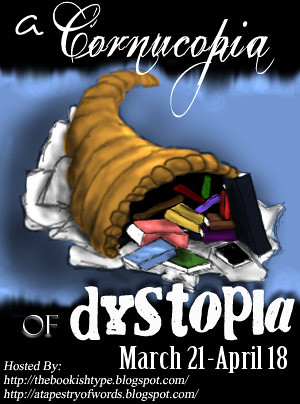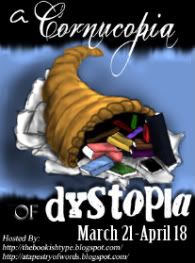 "Nora, the popular girl and happy consumer, witnesses a horrific bombing on a shopping trip with her mother. In Nora’s near-future world, terrorism is so commonplace that she can pop one little white pill to forget and go on like nothing ever happened. However, when Nora makes her first trip to a Therapeutic Forgetting Clinic, she learns what her mother, a frequent forgetter, has been frequently forgetting. Nora secretly spits out the pill and holds on to her memories. The memory of the bombing as well as her mother’s secret and her budding awareness of the world outside her little clique make it increasingly difficult for Nora to cope. She turns to two new friends, each with their own reasons to remember, and together they share their experiences with their classmates through an underground comic. They soon learn, though, they can’t get away with remembering."
"Nora, the popular girl and happy consumer, witnesses a horrific bombing on a shopping trip with her mother. In Nora’s near-future world, terrorism is so commonplace that she can pop one little white pill to forget and go on like nothing ever happened. However, when Nora makes her first trip to a Therapeutic Forgetting Clinic, she learns what her mother, a frequent forgetter, has been frequently forgetting. Nora secretly spits out the pill and holds on to her memories. The memory of the bombing as well as her mother’s secret and her budding awareness of the world outside her little clique make it increasingly difficult for Nora to cope. She turns to two new friends, each with their own reasons to remember, and together they share their experiences with their classmates through an underground comic. They soon learn, though, they can’t get away with remembering."
Memento Nora by Angie Smibert
Characters:
Memento Nora is written from the viewpoints of three teens – Winter, Nora, and Micah – with the most central one being Nora. Each of these three characters has a distinctive voice that makes it easy for the reader to hop from one viewpoint to the next without getting confused. I found Nora to be relatable and fairly easy to sympathize with; yes, she was spoiled, thoughtless and somewhat shallow in the past, but since she's telling her story from a more mature understanding now, she comes across as having grown beyond that.
I immediately liked the boyishly adorable, cocky-on-the-outside but sweet-on-the-inside Micah. The way his relationship unfolds with Nora is cute to watch, especially since we get to see both of their perspectives. Unlike a lot of YA novels these days, however, the romance doesn't take over the point of the book. Micah and Nora's romance is of the sweet and innocent variety that simply adds to the storyline without overpowering it.
I didn't connect with Winter as well as Nora, but I did find her personality interesting. Although it's never stated outright, we're given hints that she has some sort of mental health issues, perhaps bipolar disorder. Winter's artistic skill of crafting sculptures out of various materials also added some depth to her character, as did her relationship with her grandfather.
Several adults also play important roles, which is not that common in YA novels. Even better, the adults were not given stereotypical kinds of parts to play. I admit I was worried at first that the adults would swoop in and save the day, but this isn't the case. Some of them seem almost as defenseless as the teens, and they are struggling just as hard to try and save their city. Nora's relationship with both of her parents was one of the highlights for me. Her over-controlling father was extremely dislikeable, and her mother equal parts frustrating and pitiable. In particular I enjoyed that for Nora, her journey both starts and ends, in a way, with her mother.
Spoiler, highlight to read:
I thought it was fantastic that the incentive for Nora to spit out the pill was so personal and relevant: finding out that her mother was being abused by Nora's father. This was mirrored at the end when it is her mother who, having learned from Nora, decides to stop taking the pill and start making her own decisions.
Premise/plot:
Having studied psychology in university, I found the concept of erasing memory to deal with trauma to be quite fascinating as a premise for a dystopian novel. It was simplified, certainly – memory is an extremely complex thing, and in real life I doubt the forgetting pill could target such specific memories like that so effectively – but it made
Memento Nora rather different from most other dystopian YA reads. And for the purpose of the story, the science behind the forgetting pill made sense.
I also enjoyed that the dystopian aspect of this novel wasn't as "epic" or broad in scope as some books are. There isn't the "top-down" hierarchical feel that so many dystopian societies share. Rather, the dystopian flavour is inherent to everyday life, due in large part to the citizens relying so heavily on being able to pop a pill and forget. Their world is not that far from our own, and some of the comparisons hit a little too close to home for comfort.
Moreover, Smibert brings the focus of the novel to the lives of three teens, and we learn about the world through that lens. The idea of having them unite to create a comic book was creative, but I did want to see more of the effect of their work on the kids at their school. I had a hard time believing that the comic book would inspire such a panic in certain powerful quarters.
There was one event towards the end that had me confused about some characters' motives and less than convinced about the scene's believability.
Spoilery explanation: The reason for having Micah and Winter locked up for so long – and thus the need for Nora to surrender herself – seemed somewhat contrived. If Nora's dad was so worried about the TFC overhearing that his daughter was involved in the rebellion, I'm sure they could have engineered a way to get Micah and Winter alone, have them spill the beans and take their pill, and then they'd forget everything.
The ending was just perfect. It really resonated with the novel's message and drove the point home with a strong finish. I am always impressed when an author dares to take the premise as far as it'll go, so I was certainly pleased when Smibert didn't shy away from that.
Very very spoilery:
right towards the end I had the thought, "Oh, what if she actually makes them go through with it and have the pill? What an ending that would be," and then she did. It's the kind of ending that leaves you feeling torn and conflicted; I was going both, "Oh no! But Nora doesn't even remember Micah anymore!" and "Brilliant!" I actually thought it could work quite well as a stand-alone, but apparently there is a sequel planned, and there is definitely potential for taking it further.
Writing style:
The personalities of Winter, Nora and Micah were reflected in the tone of Smibert's writing as well as word choices. I thought certain words – "glossy" by Nora, "hummingbirds" by Winter – were used a bit too frequently, but they worked to remind the reader of which character's viewpoint it was. I did find the writing a bit choppy in places, and the message sometimes phrased too obviously for me, but it is a debut novel. Also, while overall the book was fairly well-paced, I found that the writing fell a little short for me in the action scenes; I wasn't getting the heart-pounding adrenaline rush as I read that I think the characters must have been experiencing. Perhaps more vivid description would have helped me to visualize it in more detail.
Final verdict: 4 shooting stars. Smibert manages to pack quite a thought-provoking story into a deceptively simple and short book. In particular, I think
Memento Nora would be a great introduction to the dystopian genre for younger teen readers.
Disclaimer: this ARC was provided by the publisher for
A Cornucopia of Dystopia.


















